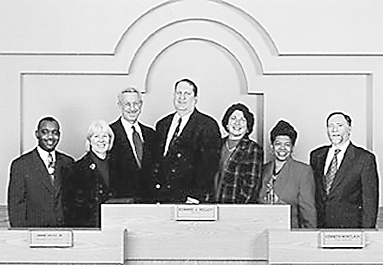Cleveland Heights lawmaker sought to have symbolic gay rights measure ruled illegal
An Ohio state appellate court in Cuyahoga County ruled against a constitutional challenge to the domestic partnership registry that was established in 2003 by the city of Cleveland Heights. The July 14 decision was unanimous in rejecting a bid by a dissident city council member to get an injunction against operation of the registry.
The Cleveland Heights registry provides official recognition for unmarried partners, but it confers no statutory rights other than to be listed in the registry. No partnership benefits are conferred on partners of municipal employees, and no entity is required to refrain from discriminating against registered partners. Thus, the registry is a symbolic method of providing a public record that a partnership exists, but nothing more.
Nonetheless, City Councilman Jimmie Hicks, Jr., was determined to prevent the law from going into effect, even though the council’s recommendation to establish the registry was submitted to a referendum of the voters, who approved it by a comfortable margin in November 2003. Just weeks before the city was to open the registry in January 2004, Hicks filed a lawsuit seeking a state court injunction. His argument was that the city did not have authority under the state constitution to establish the registry. The trial judge rejected his argument and he appealed.
Ohio’s constitution provides for broad home rule powers for cities, so long as they do not attempt to control or regulate activities outside their boundaries. The appellate court’s opinion by Judge Sean Gallagher quotes numerous prior Ohio court decisions describing the extent of municipal power.
Quoting the Ohio Supreme Court, Gallagher wrote, “The ‘powers of local self-government’ conferred upon municipalities by this constitutional provision include the power to enact local legislation, except to the extent that limitations upon that legislative power have been set forth in the Constitution. . . . To that end, the Supreme Court of Ohio has been liberal in its application of the home-rule doctrine. Indeed, the court has established that as a general policy, municipalities have the ‘broadest possible powers of self-government’ for local political issues.”
Thus, the significant question for the court was whether the voters of Cleveland Heights had attempted to extend the city’s legislative power beyond a purely local political issue. Due to the minimalist nature of the registry, it was easy for the court to conclude that no inappropriate extension had taken place.
“Here, the registry affects only the municipality itself and has no extraterritorial effects,” wrote Gallagher. “As the trial court found: ‘The city allows residents and nonresidents alike to register. However, the city of Cleveland Heights confers no benefit, right or obligation upon those registering. The taxpayers of the city incur no cost since the registering couples pay a fee to cover the entire cost of the registry. A nonresident must pay the same fee but obtains no benefit aside from their names on the registry. Foreign jurisdictions are not bound to acknowledge the registry or to confer any rights or obligations. Residents and nonresidents are free to recognize the declaration, but no other city is obligated to take notice. The registry does not create any result, either within the city or outside its territory, other than the mere existence of names on a list. Therefore, the court, applying the territorial test. . . finds the city of Cleveland Heights’ Domestic Registry to be an act of self-governance.”
The court noted that some companies have used the registry in the administration of their own domestic partnership benefits programs, but that this was not a problem because it did not involve conferring any rights by statute.
Surprisingly, there was no consideration by the court of whether the registry violates the anti-marriage amendment passed by Ohio voters in November 2004. Ohio’s amendment broadly goes beyond prohibiting same-sex marriages, by forbidding the state or its subdivisions from creating any other status comparable to marriage for unmarried couples. Perhaps because this lawsuit was filed many months before the anti-marriage amendment was passed, the parties were precluded from arguing about its application. Certainly, the minimalist nature of the registry would make it difficult to argue that it constituted a substitute form of marriage.
gaycitynews.com



































